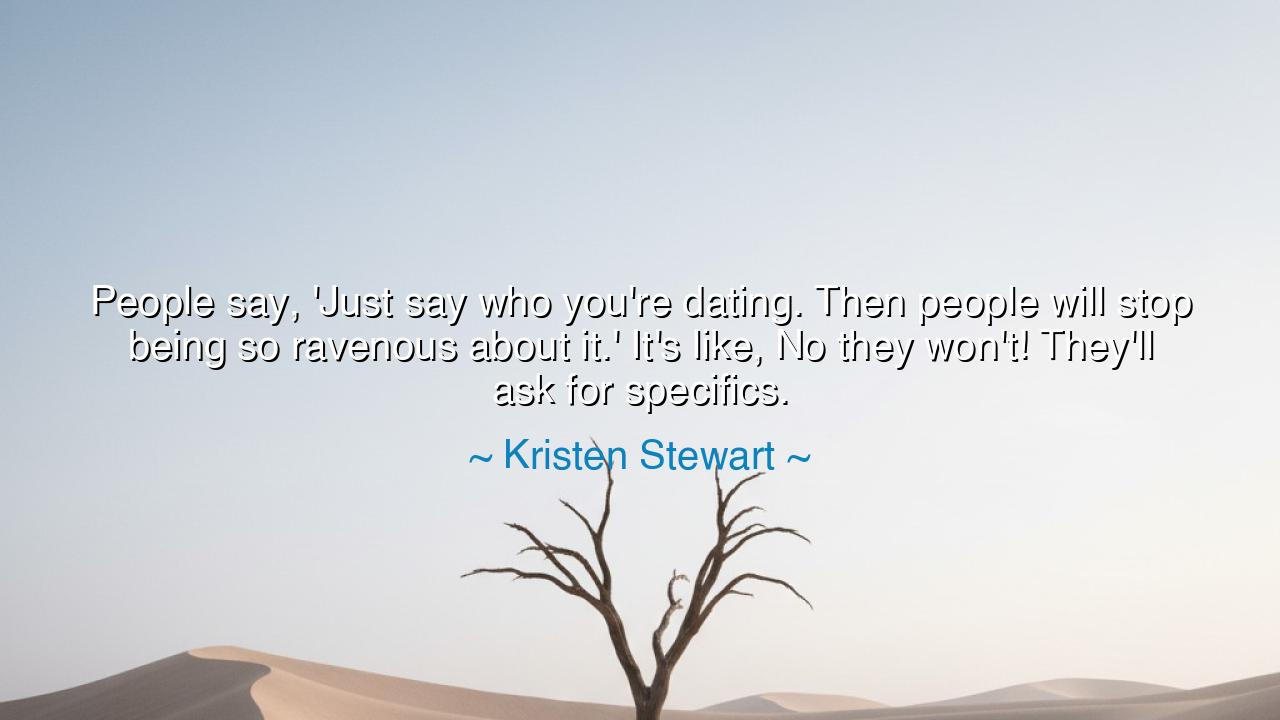
People say, 'Just say who you're dating. Then people will stop
People say, 'Just say who you're dating. Then people will stop being so ravenous about it.' It's like, No they won't! They'll ask for specifics.






There are words that emerge from the fire of experience — not spoken to please, but to warn, to reveal the hidden hunger of the world. Such are the words of Kristen Stewart, who declared: “People say, ‘Just say who you’re dating. Then people will stop being so ravenous about it.’ It’s like, No they won’t! They’ll ask for specifics.” Beneath this cry lies a truth that has echoed since the dawn of fame itself — that the more one gives to the crowd, the more it demands. It is a reflection not merely on celebrity, but on the nature of human curiosity, which, left unchecked, becomes insatiable. Her words are the lament of one who has learned that privacy, once surrendered, is never easily reclaimed.
To “just say who you’re dating” may sound like a small thing to the outside world — a simple answer to a simple question. But Stewart, speaking from the weary wisdom of one pursued by relentless attention, knows otherwise. What the world calls transparency often becomes another form of captivity. In ancient times, those who were admired by the masses — kings, poets, and prophets — knew this same paradox: that adoration is never without appetite. The people will applaud one moment and pry the next; they will love you, but they will also wish to possess every corner of your life. Stewart’s protest — “No they won’t!” — is the refusal of a soul that will not be consumed.
This tension between self and spectacle has existed as long as fame itself. The Romans told of Julius Caesar, who, though worshiped by his people, never walked the streets of Rome without bodyguards, for even admiration can carry the seed of danger. The crowd that cheers also demands, and the demand never ends. So it is in the modern age, when the stage has expanded beyond amphitheaters into the glowing mirrors of screens. What once belonged to bards and emperors now afflicts actors, artists, and even ordinary souls who live their lives under the unblinking gaze of the digital world. Stewart’s words are the voice of this age — the cry of a woman who guards her own sanctuary amid the noise of millions.
When she says they will “ask for specifics,” she reveals a deeper truth about the human desire to know — a desire that easily transforms into invasion. Curiosity is noble when it seeks understanding, but destructive when it seeks ownership. The ancients understood this too. In the myth of Orpheus and Eurydice, Orpheus is told not to look back at his beloved as he leads her from the underworld. Yet he cannot resist — his longing to see, to know, to confirm what should remain veiled, destroys what he loves most. So it is with fame: the public’s desire to see behind the curtain, to grasp what should be sacred, often ruins the very magic it adores.
And yet, Stewart’s quote is not only about the burden of fame; it is about the universal struggle for boundaries in an age that worships exposure. Each of us, in our own measure, faces this temptation — to reveal more than wisdom would allow, to trade privacy for acceptance, truth for attention. Her defiance is an act of self-preservation, but also of example: a reminder that mystery is not deceit, and that holding something back from the world is an act of dignity, not secrecy. For even the stars of heaven shine brighter because they remain distant.
Her insight also speaks to a spiritual truth. The soul, like a sacred flame, grows weaker when constantly exposed to the wind of scrutiny. To preserve one’s peace, one must learn when to speak and when to remain silent. Transparency without discretion becomes a kind of self-erasure — a surrender of depth for the illusion of openness. Stewart’s refusal to appease the crowd is, in this way, a quiet act of rebellion — a reclamation of power in a world that confuses access with affection.
The lesson, then, is as timeless as it is urgent: Protect what is sacred within you. Whether it be your love, your grief, or your dreams, not everything is meant for the public square. The wise know that boundaries are not walls, but shields — that privacy, when honored, gives strength to the self. Let others clamor for “specifics”; answer instead with calm, with grace, with the knowledge that what is unseen is often what is most valuable.
So let the words of Kristen Stewart stand as a warning to every soul in an age of endless exposure: the world will always hunger for more of you than you can safely give. Do not feed that hunger until nothing remains. Speak when your heart allows, share when it serves love or truth — but keep a sanctuary within you that no one can enter uninvited. For in that sanctuary lies your peace, your identity, and your freedom — treasures no applause can replace and no curiosity deserves to claim.






AAdministratorAdministrator
Welcome, honored guests. Please leave a comment, we will respond soon